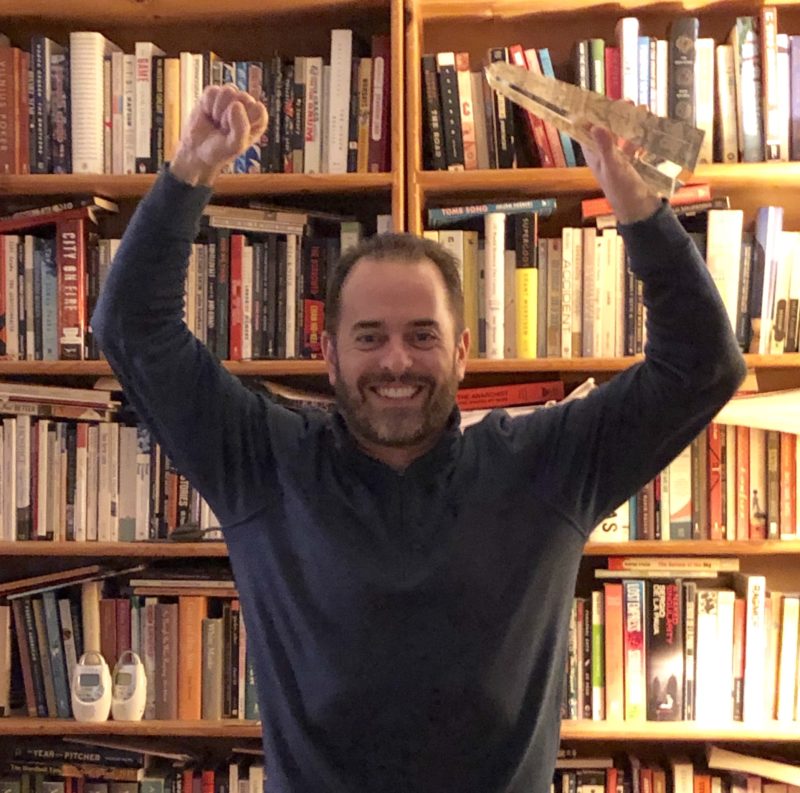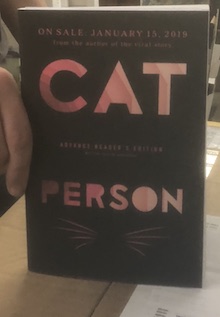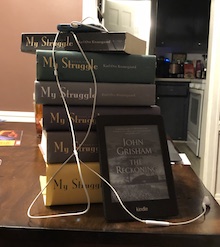My Struggle, Part II: The 60% Post
Over the past two weeks I’ve been in NYC for the Words Without Borders gala (THANK YOU AGAIN FOR THE OTTAWAY!), then to LA for the PEN Gala (amazing time with Jessica St. Clair and Dan O’Brien and you too, Ross, I suppose), to Seattle (Amazon Spheres are a thing!), and Minneapolis (sales conference isn’t sales conference without snarky texts). Over that time, I’ve more or less lost my mind and liver while coming up with about five different posts I wanted to write. I even started a few of them from my hotel room(s), only to get distracted and discouraged.

I’ve mentioned in passing—maybe in a post, definitely to a few people in real life—that there was an overarching scheme to this year of post writing. That’s not a lie! Unlike so many other projects I’ve started, there really was an intent to finish this one. But there are so few weeks left in the year . . . so many books I’d like to read just for fun instead of for some quixotic attempt to define something about the publishing industry and the role of international literature, small presses, egos and strong personalities, anti-capitalist sentiments, and bad jokes.
So I’m going to cheat a little bit.
*
The best thing about having sales conference in Minneapolis is being able to visit a number of spectacular bookstores. Milkweed is solid, Subtext is both cozy and incredibly well stocked, and Moon Palace 3.0 is bookstore paradise. (Seriously: bar/restaurant + performance space for indie rock and punk bands + gigantic bookstore with multiple levels. I AM IN LOVE AND NEED ONE HERE IN ROCHESTER. FRANCHISE ME, MOON PALACE.)
Anyway, at one of these stores I saw Cat Person for the first time.
Well, it’s not actually called “Cat Person,” is it? It’s actually You Know You Want This: “Cat Person” and Other Stories—a title that’s part ironic, part a reminder that there was a moment when the world gave fucks about short stories, and 120% unwieldy.
 In keeping with the oddness of the title, the galley is a bit of a mess. Over top of the actual cover is a black cover with “Cat Person” cut out on it, making it seem—once again—that that is the actual title.
In keeping with the oddness of the title, the galley is a bit of a mess. Over top of the actual cover is a black cover with “Cat Person” cut out on it, making it seem—once again—that that is the actual title.
Whatever, that’s not the point.
What caught our attention was the note from the publicist that was inside. It went something like this:
“Dear XXXX—
I’m 60% sure that I already sent this to you, but I KNOW you want it! So here’s another copy just in case. We’re REALLY excited about this collection!”
Have you ever, in your life heard someone say they were “60% sure” of having done something? Out of context, that sounds psychotic. “I’m 50% sure I locked the door.” Fine. “I’m 90% sure I paid that bill.” Probably not true, but fine. “I’m almost positive I forgot my child at home.” Not good, but I understand where you’re coming from. “I’m 60% sure I ate lunch.” WHAT PLANET ARE YOU FROM.
*
Then again . . . why not 60%? It’s the numerical equivalent of “trying.” I kinda did some work today. I gave it a good ol’ 60% effort. Maybe 60% is the most efficient way to live . . . Baseball is great for about 60% of every game. My posts would garner more readers if they were only 60% as long as they usually are.
So I’m going to embrace my inner 60% and wrap up a ton of threads . . . mostly.
*
Remember “My Struggle, Part I: Confusion and Value“? Me neither. But there was a lot of stuff in there about Knausgaard, caring about one’s readers, and about not being into Llansol’s Geography of Rebels trilogy, but withholding judgement until someone smarter came along and gave it a glowing review. You know, sort of like Ben Moser did about one week later.
Llansol’s writings, though, also illustrate the dangers of abolishing the structure of the traditional novel. In a novel, the reader—and she did always have at least some readers, especially after her return to Portugal—needs some way of knowing where he or she is, of knowing who is talking, of understanding why this story is being told, if any story is being told: if, that is, this is a novel at all. But the longer one inhabits Llansol’s world, the more one sees what it might mean to write against the novel, to create prose that could aspire to the status of a living being, one that moves and exists without having some artificial form imposed upon it. [. . .]
And so it is not for plot or character that we read Maria Gabriela Llansol. It is for the source of energy that her books contain. Open them to any page, like a volume of poetry; and listen to these dead people speaking.
To be fair, I did make it through about 60% of this book, and get what Ben’s saying, and, well, 60% is enough of a percent for me.
*
 It took massive hardcovers, ebook versions (my weak wrists!), and several audiobooks, but I conquered! It’s also sweetly ironic that Amazon is trying to sell me Grisham’s The Reckoning. Maybe that should be the next Two Month Review book . . . “Welcome to the Two Month Review where we concuss ourselves through boring words week after BLAM! . . . Brian? Uh, Bri— Oh, never mind, that was just the CTE setting in . . . permanently.”
It took massive hardcovers, ebook versions (my weak wrists!), and several audiobooks, but I conquered! It’s also sweetly ironic that Amazon is trying to sell me Grisham’s The Reckoning. Maybe that should be the next Two Month Review book . . . “Welcome to the Two Month Review where we concuss ourselves through boring words week after BLAM! . . . Brian? Uh, Bri— Oh, never mind, that was just the CTE setting in . . . permanently.”
*
In that same post mentioned above, I alluded to notes I had for “part II.” This is also true! But rather than try and write that whole post—it was going to be long and include a semi-logical step-by-step progression from the “unreadable” to the unreadable, from the hard to read to the do not read—let’s just get to it’s core 60%!
The function of propaganda does not lie in the scientific training of the individual, but in calling the masses’ attention to certain facts, processes, necessities, etc., whose significance is thus for the first time placed within their field of vision.
The whole art consists in doing this so skillfully that everyone will be convinced that the fact is real, the process necessary, the necessity correct, etc. But since propaganda is not and cannot be the necessity in itself, since its function, like the poster, consists in attracting the attention of the crowd, and not in educating those who are already educated or who are striving after education and knowledge, its effect for the most part must be aimed at the emotions and only to a very limited degree at the so-called intellect. [. . .]
The art of propaganda lies in understanding the emotional ideas of the great masses and finding, through a psychologically correct form, the way to the attention and thence to the heart of the broad masses. [. . .]
The receptivity of the great masses is very limited, their intelligence is small, but their power of forgetting is enormous. [. . .]
What, for example, would we say about a poster that was supposed to advertise a new soap and that described other soaps as “good”?
We would only shake our heads.
Exactly the same applies to political advertising.
This is upsetting for so many reasons. First of all, if you replace “propaganda” with “public relations,” you might believe you’re reading something by Edward Bernays. Few more tweaks and this wouldn’t seem out of place in a business class on marketing.
But it’s not. It’s by Hitler. From Mein Kampf. Which, same as all of you, I would never ever ever have read a word of—we’re not monsters!—had Knausgaard not put it inside of this last volume of My Struggle.
This is one of the least disturbing parts of Mein Kampf that he quotes.
Adding to the horror of realizing what this is the fact that Knausgaard analyzes it, breaks down the way in which the book ignores an “I” in favor of an “us” and a “we” in order to make a “them.” He points out how it’s impossible not to treat this as the document responsible for one of the worst events in the history of mankind, how history prevents us from seeing Hitler as anything other than a monster. And that’s fascinating when you start to think about it in relation to contemporary texts, books, tweets.
There’s the trope about going back in time to kill Hitler, but one of the things that comes clear in Knausgaard’s account of his life and writing is that, within the context of his time, Hitler wasn’t yet Hitler. It’s a truism that we all totally know, but one that will forever be impossible to fully comprehend. How didn’t the people of Germany know that they were in the midst of one of the most evil human beings ever?
The rest of my post was going to include: an anecdote about finding a Don Mattingly rookie card and puzzling over how I didn’t know that this would be valuable right from the start, since the name “Don Mattingly” has a ring of success to it; about what values there are/are not in reading things that everyone says are horrible or trash or offensive or wrong or whatever in order to see them for what they are; about aesthetic prejudices (see really offensive Grisham joke above) and political beliefs and filter bubbles and the desire to only read what you feel like you’ve already read.
Imagine the amazingness of the 60% of that article I didn’t ever write! I was on fire with those notes, jokes, and observations.
*
Let’s get to the whale! I mean, let’s get to the 60%!
So, here is what I wrote in my phone last January when I decided to try and read a translation+ a week and write about them here:
Don’t ever really write about the book. Or if you do, try and find some weird way—stats, high concept, stupid detail—to connect it to a larger book culture issue. Spend nine or ten months hammering away at how fucked everything is: sales, book coverage, how we value books, how mixed up publishers are about their missions and goals and why they even do this. Be bleak, but be funny. Offend people because otherwise no one will pay attention. Then, through the lens of what nonprofits are—silly to the average reader, crucial in the industry, undervalued by the rich—turn your back on everything and question the very concept of artistic value. What makes a painting valuable is one fool willing to pay for it. What makes a book valuable is a lot of fools willing to take it into their brains. At that point, you should fuck numbers. It’s like a double-heel turn. Make up sabermetrics for publishing.
I’m 60% sure that was written after my second Buffalo Trace, but I’m only 60% sure because I’m maybe psychotic and my memory is shit.
Regardless, that plan is like 60% of the way there! I got derailed on the nonprofit stuff because I read the comments/had a conversation with someone smarter and kinder than me which helped me see the error of my initial approach. And then Prozac happened and things got shiny.
But I am concerned about the future of nonprofits. Not Graywolf and Coffee House and Copper Canyon—they won! They hit the levels you need to hit to live, if not forever, until the world ends in 12 years.
If I told you, “hey, there are three-four major publishers that account for, like, 60% of all sales and funding, because they already have the budgets to support the necessary level of staffing and advances to grab the books that grab that market and lock it down through Winter Institute parties and whatnot,” would you feel good about that?
We need a diversity of presses, but, at the rate things are going, I’m not super optimistic. Everyone who’s not in NYC or Minneapolis seems very at sea. Most nonprofits are obsessed with equating sales with success with readers. Books are just an object to sell or to be funded. There is no third dimension–it’s a very linear graph in which “importance” and “number of Amazon purchases” have a 1:1 ratio. That’s wrong. But then again, a lot of these successful nonprofits have 30+ years of heavy funding to work through staffing situations, the reality that the smartest editors will ALWAYS lose their best authors if they don’t work for a multi-million dollar company.
Then again, there just aren’t national funders for nonprofit book publishers. Outside of a handful of small presses with local donors, we’re all fucked. There is no national donor to nonprofit literature anymore. There was Lannan. There is Minneapolis—if you’re based there. There’s nothing else. And to say, “cultivate your own donors!” is cute, until you realize that most of all the nonprofits exist in areas in which the literary nonprofit narrative doesn’t exist. It’s so much easier to fund a theater space, or philharmonic, or art gallery—which is why the “Rochester Arts Council” (#fakenews) never contacted anyone from the literary arts to be involved with their failed “region-wide funding” attempts (nope, you don’t count, Writers & Books! You are about self-publishing and self-exploration through writing—which, great! I do it every week!—but not “literature” in this present sense of the word).
*
Fuck it. That’s 60% enough. I tried. And I still have six more weeks of essays to write.

Leave a Reply